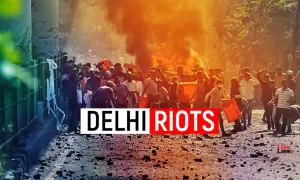That the Aam Aadmi Party is trying to beat the Bharatiya Janata Party at its own game has been evident over the past couple of years.
Its soft Hindutva has been demonstrated by its offer of free Ayodhya pilgrimages for senior citizens, party convenor and Delhi Chief Minister Arvind Kejriwal’s recitation of the Hanuman Chalsa, his declaration that he had visited a Hanuman temple after his party’s victory in the Punjab Assembly elections, the party’s ringing silence over last year’s Delhi riots and party leader Atishi’s statement that seemed to blame Delhi’s communal trouble on Rohingya Muslim refugees.
On Tuesday, when Kejriwal launched a campaign to “make India number one” in the world, he seemed to have added the Rashtriya Swayamsevak Sangh’s idea of nationalism and national pride to his arsenal. That idea is clearly a parallel to the Rashtriya Swayamsevak Sangh’s notion of making India a “vishwaguru” or world teacher.
The Hindutva organisation has often said that it aims to make India a world teacher by “providing solutions to the problems being faced by the world today”. It says that it is the god-ordained (ishwarpradatta) duty of Hindus to help the world overcome its problems.
In reality, “vishwaguru” is a euphemism for superpower. The Sangh’s use of this term is in line with its strategy of camouflaging problematic and narrow ideas with seemingly broad, benign descriptions.
The Rashtriya Swayamsevak Sangh’s frequent refrain is that the great ideas of Bharat deserve to be heard by the world but the world does not listen to the weak. Hence, Bharat needs to become strong. Needless to say, the Sangh’s plan for India to attain the position of vishwaguru involves attaining military superpowerdom, in addition to economic might.
It is not insignificant that members of the Hindutva organisation perform shastra puja (obeisance to weapons) as part of their Vijaydashami foundation day programme.
Kejriwal’s statements on Tuesday cannot but come as music to the ears of the Rashtriya Swayamsevak Sangh.
“Indians are the most intelligent people in the world,” Kejriwal said. “God has made them so.” Kejriwal’s “Indians” are not really different from the Sangh’s notion of Hindus since he is also referring to, in a sense, people who have their origins in Bharat.
At the launch event, Kejriwal took another arrow out of the Sangh’s quiver when went on to attack Jawaharlal Nehru, though without naming him. India’s first prime minister has long been a favourite target of Hindutva supporters.
“India should have invested heavily in building education infrastructure right from 1947,” Kejriwal said. “That didn’t happen…These people have only looted the country in the past 75 years.”
Before its transformation into a political organisation, the Aam Aadmi Party was a people’s movement called India Against Corruption. Its rapid rise led many to believe that it had received substantial support from the Sangh.
This suspicion was boosted when Aam Aadmi Party founder-member Prashant Bhushan, after a falling-out with the organisation, said in a television interview that it had been “supported and propped up by the BJP and the RSS for their own political purposes”.
The astounding bipolarity of Delhi voters observed during Delhi Lok Sabha and Assembly elections of 2019, where the same voters had seamlessly switched sides from the BJP to the Aam Aadmi Party cannot be viewed as a miracle. It wouldn’t have been possible without a large section of Hindutva supporters switching sides.
So, why is Kejriwal mimicking the BJP and the Rashtriya Swayamsevak Sangh?
When seen against the increasing strain between the Sangh and Narendra Modi-Amit Shah’s BJP, Kejriwal’s posturing could help the Aam Aadmi Party steer a large chunk of Hindutva votes towards itself.
This could help the Aam Aadmi Party give BJP a run for its money in the forthcoming Gujarat Assembly elections due in December. If the BJP loses some ground in Gujarat, Modi and Shah’s supremacy in the party will come under a cloud.
For now, the BJP is dominated by Modi’s personality cult, considerably weakening the Rashtriya Swayamsevak Sangh’s traditional patriarchal superiority in the relationship. From the Rashtriya Swayamsevak Sangh’s point of view, perhaps anything that clips the duo’s wings in Gujarat could go a long way in re-establishing its position.
If the Aam Aadmi Party can help do it, why not? For the Aam Aadmi Party, it could be a good way to repay the Rashtriya Swayamsevak Sangh debt from the India Against Corruption days.
(Vivek Deshpande worked with The Indian Express and is now a freelance journalist in Nagpur. Courtesy: Scroll.in.)




